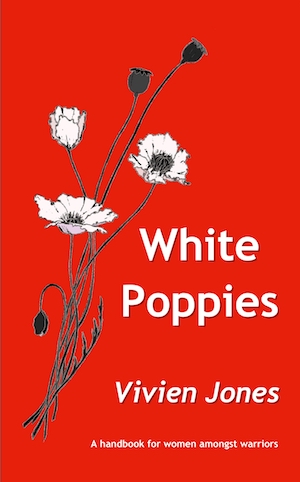
('Marines' © Jaci XIII, 2015)
*
BLOWN AWAY
by MIKE SMITH
*
I was going to begin this essay with the statement that I have not been at war, but, of course, I have been, several times in my six-and-a-half decades. I haven’t been in combat, is what I should say. I haven’t been in a killing zone.
I have been at war, though, even when it has not been declared. In Ireland, the Falklands, the Middle East. I have been at war by virtue of being a voter in a democracy that has projected its power abroad, and within its boundaries, by military means.
 Vivien Jones’ short story ‘Sorting Office’ is shorter than this essay will be, occupying just over one page in her slim volume of stories about women and war, White Poppies: A handbook for women among warriors. The title ‘Sorting Office’ title sets us up for a tale, perhaps about the field Post Office, or some aspect of letters home. But it is actually about a woman whose job is to sort out the bodies of the slain: ‘Without uniform there was no way to keep them together, or separate.’
Vivien Jones’ short story ‘Sorting Office’ is shorter than this essay will be, occupying just over one page in her slim volume of stories about women and war, White Poppies: A handbook for women among warriors. The title ‘Sorting Office’ title sets us up for a tale, perhaps about the field Post Office, or some aspect of letters home. But it is actually about a woman whose job is to sort out the bodies of the slain: ‘Without uniform there was no way to keep them together, or separate.’
This opening sentence only slightly disguises its meaning, just enough to make you ask if that can really be what it says. After all, that title seemed so innocuous. The second sentence nails it down irrefutably: ‘Clothes blow off much easier than limbs…’
Vivien Jones is a direct writer, with a deceiving simplicity of style, and in this very short story, a flash fiction by most measures, the simplicity and the deception are well employed. Structured as two half-page paragraphs, and a four-line ending, it establishes a path for a denouement that will surprise, although it is a conclusion that is, at the same time, entirely probable, rather than merely plausible.
The first paragraph sets a scene: the sorting of body parts and how it might be carried out. With forensic detail, and detachment, Jones gives us an idea of what the parts are, and of how many, and how they are to be matched up: ‘skin tone’, ‘well-shaped nails’, and ‘pale soles or palms’ might not be ideal, but ‘there was no DNA analysis within a thousand miles’. In fact, apart from that ‘thousand miles’, which puts the story geographically a long way from ‘us’, a long way from civilisation – where DNA analysis would be possible – there is only the single hint, in the word ‘sand’ – from which these bodies are being recovered – as to where this story is set.
Over and again, in Jones’ work we come down to the hints of single words, and individual phrases, to imply potentially much larger descriptions that our imaginations will be left to fill out.
‘Sorting Office’ has, what I would call, a classic short story structure: a general background, followed by the individual circumstances of the protagonist. In the second paragraph, the sorting officer is ‘troubled’ by an armless Asian body, for which two arms ‘found a hundred metres apart’ have been brought in. But do they belong to the same corpse? One carries a tattooed name, ‘Marty’, the other shows ‘a woven wrist band with intricate Arabic letters’. The name implies ‘surely not an Asian’ – that is, if it is a name, and complete – but the label? The sorter speculates: ‘His mosque? His betrothed?’ Determined to find out more, she copies out the lettering and sends it off to HQ – the only clue by which we know she is in the services – for analysis.
 The punch line follows with the return. The label reads ‘Made in Birmingham’. The jolt is both comic and chilling; an anti-climax in its banality, but also a startling double entendre that projects the story into a political speculation that we must make, beyond the two options that the sorting officer has previously given us.
The punch line follows with the return. The label reads ‘Made in Birmingham’. The jolt is both comic and chilling; an anti-climax in its banality, but also a startling double entendre that projects the story into a political speculation that we must make, beyond the two options that the sorting officer has previously given us.
It’s often pointed out that the shorter a story is, the more finely it must be wrought, and this is a fine example of a nicely pointed story. The resolution, for the sorting officer, closes down her speculation, but ours is opened out. The reader, by looking into the closed world of this small tale, sees not only inside it, but through it, to the wider world beyond.
My only caveat with the story would be its closing line, in which the sorter zips the body into its bag, labels it ‘Intact’ and calls for it to be removed. It’s one of those ‘full stop shots’ that you might use in a TV drama after the action has finished, and as the credits begin to roll, but hasn’t the story really ended with that revelation about the label? Adding more seems somehow unnecessary. Yet, on reflection, perhaps it does add one more piece of hidden significance, implying perhaps that, for the sorting officer, her job is done. The shock of finding out what the label says is not what the story is about so much as the realisation of what it might mean metaphorically: as a line in a story. And that is a realisation that the author, in that last line, does not give to her protagonist. It is for us to speculate about the double meaning of the phrase, not for her.
~

~
Mike Smith writes short fiction as Brindley Hallam Dennis, and poetry, plays and essays as himself! He lives on the edge of England and blogs at www.Bhdandme.wordpress.com
**


One thought on “Blown Away”
Comments are closed.